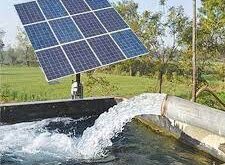
Solar Water Pumps
Solar water pumps are devices that utilize solar energy to pump water from a water source, such as a well, borehole, or reservoir, to a desired location. They are equipped with solar panels that capture sunlight and convert it into electrical energy, which powers the pump mechanism. These pumps are commonly used in agricultural irrigation, livestock watering, water supply for remote communities, and various other applications where access to electricity may be limited or unreliable.
Solar water pumps offer several advantages over traditional diesel or electric pumps
Energy Efficiency: Solar water pumps operate using renewable solar energy, reducing operating costs and dependence on fossil fuels.
Environmentally Friendly: By using clean energy from the sun, solar water pumps produce no greenhouse gas emissions or air pollution, contributing to environmental sustainability.
Remote Operation: Solar water pumps can be installed in remote or off-grid locations where access to electricity is limited, providing reliable water supply without the need for costly infrastructure development.
Low Maintenance: Compared to diesel or electric pumps, solar water pumps typically have fewer moving parts and require less maintenance, resulting in lower long-term operating costs.
The key components of a solar water pump system
Solar Panels
These panels capture sunlight and convert it into electrical energy through photovoltaic cells
Submersible Pump
The pump is responsible for drawing water from the water source and delivering it to the desired location. Submersible pumps are often used in solar water pump systems
Motor or Pump Controller:
The motor controller regulates the operation of the pump motor, ensuring efficient use of the electrical energy generated by the solar panels
Water Storage Tank
Depending on the application, the water pumped by the solar water pump may be stored in a tank for later use .


